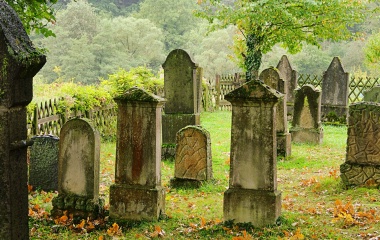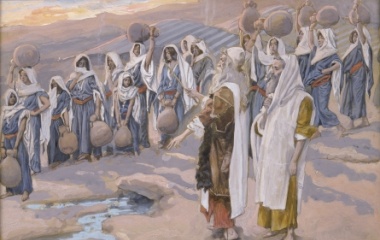
The story of the attack by Amalek upon the newly freed slaves from Egypt appears twice in the Torah, once in our parsha and once 40 years later in parshat Ki-Teze as Moshe prepares the descendants of those who left Egypt to finally enter the Land of Israel. While they describe the same one event, they are presented in two very different ways – serving two very different purposes.
In parshat Beshalach the battle with Amalek concludes a series of crises that faced the nascent nation faced as they left Egypt. They may have been enslaved in Egypt but at least their daily needs were taken care of. They really did have “fish and leeks” (Bamidbar 11:5) in Egypt. In the barren desert there was no one but G-d to provide for them. Learning to trust that G-d would provide for them and lead them to the Promised Land was not something that came easily, something that G-d well understood – even if Moshe may not have.
Through the challenges they faced, G-d was teaching the people that it is He who is our Provider and Sustainer – not only in the desert but also in the Land of Israel, where human effort and success would make forgetting G-d easy to do. Witnessing the great miracle of the splitting of the sea at the exact necessary moment, the people sang a great song of praise to G-d. Yet a mere 30 days later they were bickering and complaining – for good reason. “If only we had died by the hand of the Lord in the land of Egypt, when we sat by the fleshpots, when we ate our fill of bread! For you have brought us out into this wilderness to starve this whole congregation to death” (Shemot 16:3).
G-d’s calm response was to provide manna – “that I may thus test them, to see whether they will follow My instructions or not” (Shemot 16:4). Would the Jewish people, seeing the power of G-d to provide food form heaven, follow His commandments? Alas, they did not “But they paid no attention to Moshe; some of them left of it until morning, and it became infested with maggots and stank. And Moshe was angry with them” (Shemot 16:20). Yet G-d was not as He understood that it would take time for the people to learn to listen.
If G-d’s providing of food did not lead to trust in G-d, perhaps G-d’s providing water would. “They encamped at Rephidim, and there was no water for the people to drink[1]. The people quarrelled with Moshe. Give us water to drink,’ they said; and Moses replied to them, ‘Why do you quarrel with me? Why do you try the Lord;” (Shemot 17:1-2). The Torah provides the people's answer; "The people thirsted there for water, and the people complained against Moses, and they said, Why have you brought us up from Egypt to make me and my children and my livestock die of thirst?"
While Moshe was upset at the people “saying, what shall I do with this people? Before long they will be stoning me!”(Shemot 17:4), G-d understood that if you bring people, not to mention slaves, to the desert and don’t give them water they will rightfully complain. G-d thus instructs Moshe to, “Strike the rock and water will issue from it, and the people will drink” (Shemot 17:6). And so it was.
Yet educating a nation, one used to slavery, is no easy task and the despite getting water from a rock the people wondered “is G-d present among us or not?” (Shemot 17:7). More teaching and demonstration of G-d’s dominion was needed, this time due to a direct and immediate threat to life. “Amalek came and fought with Israel at Rephidim” (Shemot 17:8). Once again G-d demonstrates it is He who is the greatest warrior – something the people had acknowledged after crossing the sea, but apparently needed a fresh reminder of.
“Whenever Moshe held up his hand, Israel prevailed; but whenever he let down his hand, Amalek prevailed” (Shemot 17:11). Emphasizing the Divine hand in the battle our Sages note, “Did the hands of Moshe make war or break war? Rather, as long as the Jewish people turned their eyes upward and subjected their hearts to their Father in Heaven, they prevailed, but if not, they fell (Mishna Rosh Hashanah 3:8).
The war against Amalek was meant to teach the people G-d does dwell amongst us and is there to help. It is the Jewish people who are the focus in parshat Beshalach and Amalek serves as the method to educate the people. It is a very different story when Moshe recounts the battle to the generation about to enter the Land. Here the focus is on Amalek, on the evil perpetrated and our duty to eradicate it. “Remember what Amalek did to you on the way, when you went out of Egypt” (Devarim 25:17).
Moshe is no longer speaking to a group of slaves who were but passive observers who could do little more than look heavenward and watch G-d fight for them. In sefer Devarim Moshe is speaking to those who would need to fight for themselves if they were to conquer the land of Israel. Amalek is no longer the means by which we would recognize G-d, but an enemy unleashed due to our sins. Amalek attacked when “you were tired and weary and did not fear G-d”. The ambiguity as to whether or not fearing G-d refers to Amalek or the Jews allows and demands that we interpret it both ways. We must not only focus on the evil of Amalek but must also ask ourselves what message we can learn when we face the many variations of Amalek.
When it comes to Amalek the message is clear. The command to remember Amalek follows on the heel of the prohibition, “Do not have in your pocket a stone [weight] and a stone, large and small; a perfect and honest stone you shall have” (Devarim 25:14). Our Sages, quoted by Rashi, simply note, “If you cheat in your weights, be worried from the lion [Amalek]”.
Amalek (and the Jewish people) did “not fear G-d”. The Torah teaches that the primary way to show our fear of G-d is through honesty in our monetary dealings. Such demonstrates our belief that it is G-d who decrees on Rosh Hashanah how much wealth we will have (Beitzah 16a). And that it is He who provides our food, our water and fights our battles. We are His partners – but G-d does not want as partners those who think they know better than He how wealth is to be distributed. It is Amalek who teaches that used inappropriately money is the root of all evil.
[1] This was actually the second time they lacked water. Three days after leaving Yam Suf "they came to Marah, but they could not drink water from Marah because it was bitter; therefore, it was named Marah" (Shemot 16:23). That episode however, ended very quickly before they could claim that it would have been better to die in Egypt.
I want to express my gratitude to Leon Kass whose wonderful book, Founding God's Nation: Reading Exodus inspired many of the ideas above.



